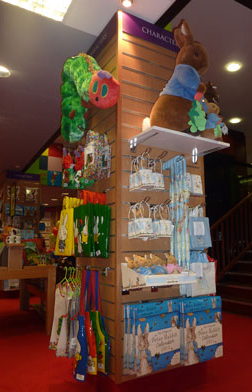Point-of-sale materials

This is the term (often abbreviated to POS, and called Point of Purchase or POP in other industries) for promotional materials displayed where high-profile books are paid for, such as boxes to hold large quantities of stock (usually called dump bins), bookmarks, balloons and posters.
Their chief function is to persuade booksellers to take more stock (the dump bin is supplied free if full of books) and to remind the potential purchaser to buy, so the words used on them must be both interesting and legible (preferably from the other side of the store). The prominent panel at the top of a dump bin may not include the author’s name or book title. This is sensible, as your book will appear many times, face-front, beneath.
Whilst POS materials are not routinely available – they are produced for titles for which the publishers have particularly strong expectations – there is scope for producing low-cost point-of-sale materials that still have an impact on the market’s willingness to buy.
As the producers of ink on paper, publishers have an ability to create such things much more cost-effectively than other manufacturers. The following can all be produced relatively cheaply:
- Postcards for handing out at the till
- Bookmarks that use the cover artwork
- Badges (particularly good for children’s titles)
- Mugs
- Balloons
- Shelf wobblers (T-shaped pieces of card that sit beneath the books on the shelf and protrude to attract attention)
- Posters
Even if your publisher is not producing point of sale, they may still produce a ’showcard’ for you if you are planning to talk. This is a poster-like piece of information announcing your book, presented on card with a stand behind it, like a photograph frame, so it will stay upright.
Leaflets and flyers (simple leaflets)
Leaflets and flyers produced for books are usually as multipurpose as possible. The publisher will probably not be able to afford to produce a separate flyer for each occasion on which one is needed, but will try to produce stock that will meet most needs.
For example, the same leaflet could be handed out at exhibitions, used as the basis of a mail shot (probably with the addition of an accompanying letter and a reply envelope), sent to interested enquirers, and given to authors for their own use.
If you really want leaflets that detail a special offer for a particular occasion, it might be cheaper for them to sticker existing stock than produce a special reprint.
If you are asked to help
Provide quotations and testimonials that your publisher would not otherwise have access to (e.g. reviews in your local paper or that you have spotted on Amazon).
If anyone says anything pertinent to you about your book, write it down and ask if they are happy for you to use it for promotional purposes – then feed it back to the publisher. New quotes allow them to freshen up their marketing materials.
If you are asked how much stock you would like, take plenty. It’s much cheaper to increase the print run by 500 than to have to reprint later on (hence the answer, if you run out later and want more, may well be negative).
Comments